The fourth sessions of the Governing Council and the Technical Committee of APCAEM was held in Chiang Rai, Thailand from 10-13 February 2009

The 4th Session of the Technical Committee and the 4th Session of the Governing Council of the United Nations Asian and Pacific Centre for Agricultural Engineering and Machinery (UNAPCAEM) were held on February 10-13, 2009 in Chiang Rai Thailand. The meetings were co-sponsored by the Foreign Agricultural Relations Division, Ministry of Agriculture and Cooperatives, Royal Thai Government. Deputy Permanent Secretary of Ministry of Agriculture and Cooperatives, Royal Thai Government, Deputy Executive Secretary of ESCAP, Provincial Governor of Chiang Rai and 25 participants from 12 Asia Pacific countries attended the meetings.
The theme of the Session is Strategic Approach to the Improvement of Agricultural Productivity towards Food Security in Asia and the Pacific. A feasibility study on the Application of Green Technology for Sustainable Agriculture Development was presented at the meeting. Participants exchanged views on national food security situations and policies to promote sustainable agricultural development in the region. In-depth discussions were held on crucial issues of rising food price and fluctuating energy price and their challenges on food security and sustainability, impacts of global climate change on agricultural production and challenges for agricultural technology, and agricultural engineering and machinery technology for food security and agricultural sustainability. Participants also reviewed the work report of UNAPCAEM for 2008, and adopted the programme work for 2009 and the financial statement for 2008.
To substantially tackle food insecurity in the region, the meetings agreed that UNAPCAEM’s projects and programmes would be strengthened via South-South Cooperation with additional emphasis on agricultural science and technology including clean and post-harvest technologies, as guiding principles for future work undertaken by UNAPCAEM.
Food insecurity has become a threat that is gripping the Asia and Pacific region and could jeopardize its remarkable economic, social and agricultural gains. Rising food price and fluctuating energy price have severely stressed the most vulnerable groups particularly in Asian developing countries. Compounded by climate change, food insecurity is threatening to undermine global fight against poverty and the accomplishment of MDGs. Despite efforts to accelerate economic growth and reduce poverty, the Asia and Pacific region has seen an uneven progress in moving towards the target of cutting hunger by half by 2015 (the first of the MDG Goals).
Dr. Amitava Mukherjee, Officer-in-Charge/Senior Economic Affairs Officer of UNAPCAEM stressed in his opening statement that “tackling food security presents a major challenge not just to our region, but the world as a whole and can unravel all the achievement of the MDG’s, suspending the hard won agricultural gains of developing countries.”
The meetings served as a platform to formally redouble Asia-Pacific efforts to sustain agricultural advances as well as face increasing challenges to food security in the region. Against this backdrop, UNAPCAEM has repositioned itself to focus on agriculture technology innovation and transfer to address such challenges as food insecurity in the region.
Noting that no single international organization can address the serious challenges outlined above, UNAPCAEM vows to build strong analytical and policy capacities to provide more strategic technical assistance for more effective policy-making and institutional capacity building in the context of regional and South-South Cooperation. UNAPCAEM will fortify its relationships with all key stakeholders as well as with the UN Country Team in China, and expressed great thanks to the Government of the People’s Republic of China and its focal point for UNAPCAEM, the Chinese Academy of Engineering for providing continued and long-term host country support.
UNAPCAEM, as one of the five Regional Institutions of The United Nations Economic and Social Commission for Asia and the Pacific (UNESCAP), in collaboration with the UN system, collectively reviews, assesses and supports the progress of individual countries, sub-regions, and the entire region as a whole in meeting the MDGs and the internationally agreed development goals to ensure sustainable and inclusive development in the region. UNAPCAEM is one example of the United Nations continually tailoring itself to meet the diverse needs of countries as “a centre of excellence for delivering more effective services to member states”.

